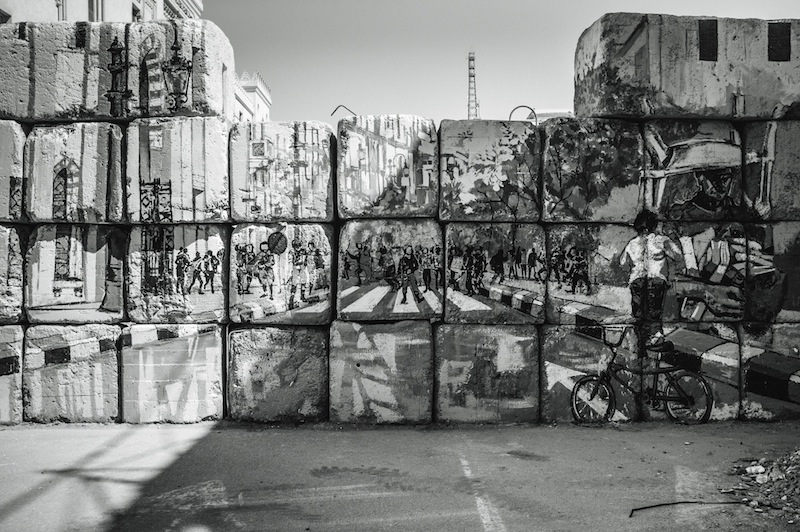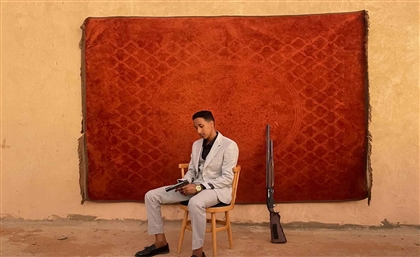Emine Gozde Sevim: Embedding Egypt in Collective Memory
The Turkish-born photographer's new book captures the zeitgeist of revolutionary Egypt with unique yet relatable recollection of those fateful weeks, all shot in haunting black and white. Here she relives the memories with us...

With all the different media outlets in this day and age, you can chose to witness the unraveling of history in the comfort of your own home. The thing is, no matter the amount of satellite channels, and all the different sources and opinions, being on the ground makes the world of a difference. Photographer Emine Gozde Sevim was not content sitting on the sidelines as the Egyptian uprising engulfed the country and beyond. No, the Turkish-born photographer chose to immerse herself in the atmosphere of the January 25th revolution, capturing moments that symbolised the public's mood during such a historic event. Currently living in the States, Sevim has managed to make her experience tangible through photos that are both raw and perfectly composed, which have been embodied in her new book, Embed in Egypt expected to be published this summer. It almost seems intrusive looking at her photographs, documenting not only her experience in Egypt, but giving us collective flashbacks, pulled out of our subconscious; a fading memory in black and white. Arriving in Egypt weeks before the first elections (parliamentary elections) in November 2011 her work encompasses a period between November 2011 and March 2013.

What inspired you to simply grab your camera and commit to this kind of dangerous and sensitive environment?
I'm interested in history and the role it plays on the personal, existentialist ways. Just like the rest of the world, I was watching the news coming out of Egypt during the days of the January 25th Revolution. I have the feeling that there is usually an attempt to define complex situations such as this one into two-word, conjoined terms, to simplify in an attempt to explain it. I wasn't satisfied with that. I felt only by truly engaging in that reality, by being there, I had a chance to understand it better and I believed what was happening in Egypt, being the largest of the Arab countries is important and this period historical somehow.
When history is on the move, the environment is certainly sensitive, and at times, it is more dangerous than anything else but there is also a continuity of a life beyond that. The experience of these times is multi-dimensional and complex but it also teaches one a lot about life and the self. So this type of commitment for me comes from a personal place, an inner feeling of intrigue that I feel I must follow with no pre-determined results.
Why black and white? What story were you trying to tell? Or is this a series of small stories?
The story is about an experience, without a beginning or an end, with a focus on the feeling of a time-in-passing when parallel realities (that of the streets and that of a personal kind) waves in and out over time. I actually first began in colour but then the story I was living in very quickly was becoming of a time in the past. So, it felt more appropriate to be in black and white.

You use no captions and this has made the book all the more powerful. Was this your aim all along? An effective expression of what was happening?
There are no captions and there are very few words (only outtakes from my personal journals from that time) but certainly no explanatory text, only few lines as a way to guide the viewer through the experience in the book. I wanted to refrain from "explaining" because unless it is volumes, would be too little to explain it all. I also felt the silence in this way allows for listening to the experience itself better.

Did you get into any trouble? Tell us about a point where you were in danger and thought you wouldn't be able to continue...
Never in Egypt did I think that I wouldn't be able to continue. Yes, at times, things were happening and it felt like everything could come loose and I could be caught in the middle of it. There were difficulties and unpredictability to the experience sometimes but never to the point of having to stop, or leave. More than anything, I think it was the emotional toll that it was taking on me during times of violence that I recall being the most difficult to reconcile.

Is there anything you wanted to capture but were unable to use your camera because of safety or other reasons?
Of course, there were tense moments but I haven't had a personal experience where I was attacked in anyway. Sometimes, a camera can cause a point of contention, especially as a foreigner in any place. There were times where I was asked to put away the camera but in no situation that I recall as "missing" a picture because of it.

Do you feel the book has succeeded in capturing your experience as well as the general mood of Egypt at that point?
I think as the author of the work, I can't claim that this is what everyone felt but only that this was my experience in Egypt at this time. The story, as much as it is particular, it is also universal. Anyone who has touched elbows with history and/or Egypt, I hope, will find a connection. For the people who have experienced this period in Egypt (Egyptians and others who were there), especially if they find the book as a reflection of their own memory from this time, then that point of connection is really the magic.

Describe your series or experience in three words...Or, if you want, one specific picture.
I think it would be easier to mark it with a picture, which would be the one at night at the amusement park where there is a number of guys sitting on a ride, all buckled to it (below). It's backlit, faces are invisible; however, you can see the figures and they coincidentally are wearing the same type of shoes. It is surreal, not fully revealed. This picture always gives me a feeling of imprisonment and yet it is at the amusement park where one is supposed to enjoy oneself. Not only for this experience but it feels at times it is a metaphor for the modern life itself.

What happened was a whirlwind that was social, political and simply affected all aspects of our lives. Is photography alone an effective median to capture all these different angles?
In the case of documentary photography, since what is photographed did in fact happen, in telling of events that actually took place, it has credibility. At the same time, photography stops time, fragments it and allows for lack of direct answers, which is great to invite the viewers to engage. I think any medium can express this but what is fundamental is to see it in that infiltrating perspective.

Would you go through this again?
I would in that the people I've met, the friends I've made, and the experience, even with the darkness of it all at times, were life-changing for me. In a different way, I am going through it again because right after my last visit to Egypt, I came to Turkey to be with my family and Gezi protests exploded. Of course, it is a different experience but again one in the trenches of a historical shift, confrontation with the self and with (at least a portion of) humanity. Of course each place, the people and therefore the story are different but in the core of it all, I find that it is the same searching.

Emine Gozde Sevim's book Embed in Egypt will be out this summer. Find out more here.
- Previous Article Bazarna Brings on Water Guns, Picnic Baskets and Trinkets
- Next Article 10 Strictly Egyptian Moustaches That Will Inspire You This Movember























